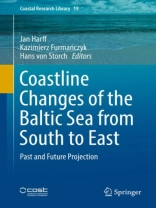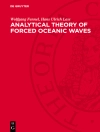This book discusses sea-level and coastline changes. These topics are becoming increasingly important for populations living along the edge of the world’s oceans and seas, especially in areas where eustatic sea-level rise is superimposed on isostatic subsidence and storm-induced coastal erosion. This is the case at the southern and eastern Baltic Sea coast: in the south, glacio-isostatic subsidence enhances the effect of climate-induced sea-level rise and strong storm effects are causing a continuous retreat of the coast. On the eastern coast glacio-isostatic uplift compensates for eustatic sea-level rise, but storm-induced waves are responsible for permanent morphodynamic changes to the coastline. There is an increasing need for protection concepts for defense but also for the economic use of the different types of coastal zones. The elaboration of these management concepts can be facilitated through models that generate future projections of coastal developments in the light of modern climate change. This anthology comprises the results of the research project “Coastline Changes of the southern Baltic Sea – Past and future projection (Co Pa F)” funded by the Polish Ministry of Science and Higher Education, which was run by a team of Estonian, German, Lithuanian, and Polish geoscientists and coastal engineers from 2010 to 2013 and overlapped with and complemented the work of COST Action SPLASHCOS supported by COST (European Cooperation in Science and Technology). As the southern and eastern Baltic serves as a natural laboratory for the investigation of coastal processes, the project’s findings contribute not only to the solution of regional problems in Baltic coastal research and engineering, but also to worldwide interests in description, modelling and parameterization of coastal processes and morphodynamics.
Table des matières
Introduction.- Part 1 A Concepts and model approaches.- Chapter 1 What determines the change of coastlines in the Baltic Sea? (Jan Harff, Junjie Deng, Joanna Dudzinska-Nowak, Peter Froehle, Andreas Groh, Birgit Hünicke, Tarmo Soomere, Wenyan Zhang).- Chapter 2 The Challenge of Baltic Sea level change(Birgit Hünicke, Eduardo Zorita, Hans von Storch).- Chapter 3 Recent Baltic sea-level changes induced by past and present ice masses(Andreas Groh, Andreas Richter, Reinhard Dietrich).- Chapter 4 Factors and processes forming the Polish Southern Baltic Sea coast on various temporal and spatial scales(Stanisław Musielak, Kazimierz Furmańczyk, Natalia Bugajny).- Chapter 5 The Dynamic Equilibrium Shore Model for the reconstruction and future projection of coastal morphodynamics(Junjie Deng, Jan Harff, Wenyan Zhang, Ralf Schneider, Joanna Dudzinska-Nowak, Andrzej Giza, Pawel Terefenko, Kazimierz Furmanczyk).- Chapter 6 Modeling of medium-term (decadal) coastal foredune morphodynamics- historical hindcast and future scenarios of the Świna Gate barrier coast (southern Baltic Sea)( Wenyan Zhang, Ralf Schneider, Jan Harff, Birgit Hünicke, Peter Fröhle).- Chapter 7 Constraints of Radiocarbon Dating in Southeastern Baltic Lagoons: Assessing the Vital Effects(Albertas Bitinas, Jonas Mažeika, Ilya V. Buynevich, Aldona Damušytė, Anatoly Molodkov, Alma Grigienė).- Part B Regional studies.- Chpater 8 Late Glacial to Holocene environmental changes (with particular reference to salinity) in the southern Baltic reconstructed from shallow water lagoon sediments(Andrzej Witkowski, Bernard Cedro, Sławomir Dobosz, Alistair W.R. Seddon, Agnieszka Kierzek).- Chapter 9 Postglacial evolution of the Odra River mouth, Poland-Germany(Ryszard Krzysztof Borówka, Andrzej Osadczuk, Krystyna Osadczuk, Andrzej Witkowski, Artur Skowronek, Małgorzata Latałowa, Kamila Mianowicz).- Chapter 10 Morphodynamic processes of the Swina Gate coastal zone development (southern Baltic Sea) (Joanna Dudzinska-Nowak).-Chapter 11 New demands on old maps - An approach for estimating aspects of accuracy of old maps as basis for landscape development research(Jörg Hartleib, Bernd Bobertz).- Chapter 12 Reconstruction of coastline changes by the comparisons of historical maps at the Pomeranian Bay, southern Baltic Sea(Junjie Deng, Jan Harff, Andrzej Giza, Jörg Hartleib, Joanna Dudzinska-Nowak, Bernd Bobertz, Kazimierz Furmanczyk, Reinhard Zölitz).- Chapter 13 Changes in the Szczecin Lagoon shoreline as determined from selected 17th and 19th century maps(Krzysztof Siedlik).- Chapter 14 Retrieving the signal of climate change from numerically simulated sediment transport along the eastern Baltic Sea coast(Tarmo Soomere, Maija Viška, Katri Pindsoo).- Chapter 15 Sea-level change and flood risks at Estonian coastal zone(Alar Rosentau, Merle Muru, Martin Gauk, Tõnis Oja, Aive Liibusk, Tarmo Kall, Enn Karro, Antti Roose, Mait Sepp, Ants Tammepuu, Jaan Tross, Marge Uppin)












